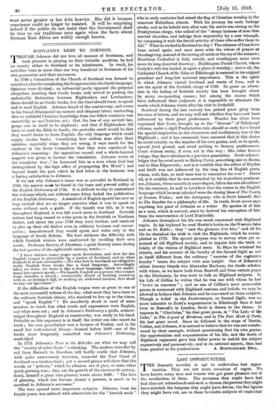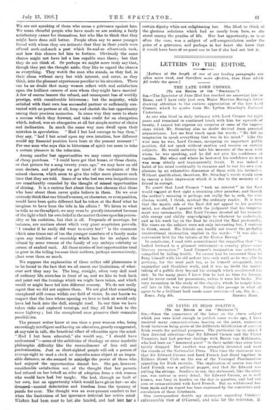LASTOPPORTUNITIES.
r I 1.111. domestic moralist is apt to undervalue lost oppor- tunities. They are not mere occasions of regret. We have known many men and women who got great pleasure out of the recollection of them. The successes they might have had had they not refused such-and-such a chance, the persons they might have married, the bargains they might have driven, the fine figures they might have cut, are to them favourite subjects of cogitation.
We are not speaking of those who nurse a grievance against fate. We mean cheerful people who have made or are making a fairly satisfactory career for themselves, but who lBre to think that they might have done still better. People often say to some younger friend with whom they are intimate that they in their youth were offered such-and-such a post which So-and-so afterwards took, and how this chance led him to fortune. Obviously the same chance might not have led a less capable man there ; but that they do not think of. Or perhaps we might more truly say that, though they put the thought aside, they like to regard the chance as everything. They watch the man who stands, as they feel, in their shoes without envy but with interest, and enter, as they think, into the pleasant experiences peculiar to his situation. There can be no doubt that many women reflect with real satisfaction upon the brilliant careers of men whom they might have married A few of eourse lament the refusal, and consequent loss of worldly prestige, •with considerable bitterness ; but the majority, while satisfied with their own less successful partner or sufficiently con- tented with no partner at all, keep and cherish the lost opportunity among their precious memories. In some way they seem to share a success which they forwent, and take credit for an abnegation which, indeed, was no abnegation at all but simple matter of choice and inclination. In much the same way men dwell upon their mistakes in speculation. " Had I but had courage to buy then," they say, " had I but acted upon my own intuition, how different would nry financial position have been at the present moment ! " For one man who says this in bitterness of spirit ten seem to take a certain pleasure in the reflection.
Among smaller lost opportunities we may count opportunities of cheap purchase. " I could have got that house, or those chairs, or that picture for a song twenty years ago," we may hear an old man declare, and perhaps we get tired of the recitation of the missed chances, which seem to give the teller more pleasure each time that they are told. Some of us who feel our own insignificance are considerably consoled by the thought of missed opportunities of shining. It is a curious fact about these lost chances that those who hear about them never quite believe in them. Do we ever seriously think that our friend's career, or character, or even position, would have been quite different had he taken at the flood what he imagines to have been the tide in his affairs ? We listen to what he tells us on thesubject, we may even be greatly interested because of the light which his own belief in the matter throws upon his person- ality or his ambition, but that is all. Proposals of marriage, for instance, are matters about which very great scepticism prevails.
I wonder if he really did want to marry her ?" is the comment which nine times out of ten the younger members of a family make upon any tradition of courtship which has for its subject the refusal by some woman of the family of any embryo celebrity or person of exalted rank. All these stories of lost opportunities tend to grow in the tell.* because their authors, perhaps unconsciously, gloat over them so much.
We suppose the explanation of these rather odd phenomena is to be found in the fact that we all resent our limitations, of what- ever sort they may be. The long, straight, often very dull road of ordinary life stretches in front of us, and we like to look back and point out the turnings which we might have taken, and which would or might have led into different scenery. We do not really regret that we did not explore them. We are glad that something unexplored still comes within our field of vision. In our hearts we suspect that the lane whose opening we love to look at would only have led back into the dull, straight road. In our time we have taken risks and explored turnings, and they all led back to the same highway ; but the unexplored ones preserve their romantic
possibilities.
The present writer knew at one time a poor woman who, being exceedingly intelligent and having no education, greatly exaggerated, at any rate in talk, the beneficial effect of education upon the mind. " Had I but been educated," she would say, " I should have understood "—some of the subtleties of theology or some insoluble philosophic difficulty like the reconcilement of free will and predestination. Just as short-sighted people will ask a person of average sight to read a clock or describe some object at an impos- sible distance, so she seemed to misjudge the power of those who had enjoyed the opportunities denied her. She got, however, considerable satisfaction out of the thought that her parents had refused on her behalf an offer of adoption from a rich woman who would have had her taught. She had, through no fault of her own, lost an opportunity which would have given her—so she dreamed—mental delectation and freedom from the tyranny of puzzle for ever. The thought was an ever-present comfort to her when the limitations of her ignorance irritated her active mind• Wisdom had been near to her, she fancied, and had lent her 2, certain dignity while not enlightening her. She liked to think of the glorious solutions which had so nearly been hers, as she stood among the puzzles of life. Her lost opportunity, as is so often the case, was a subject of self-congratulation under the guise of a grievance, and perhaps in her heart she knew that it would have been of no great use to her if she had not lost it.



























 Previous page
Previous page